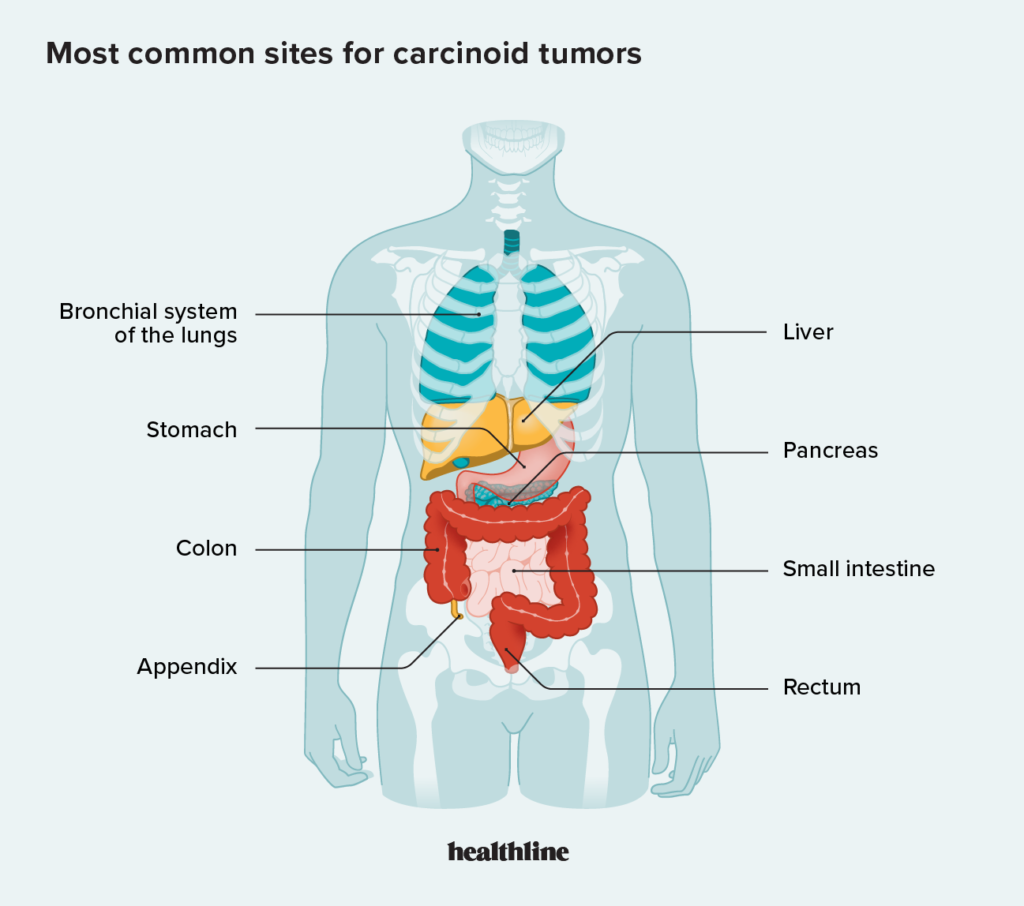Carcinoid syndrome is a rare medical condition caused by the release of certain chemicals, such as serotonin, into the bloodstream by neuroendocrine tumors (NETs). These tumors typically arise in the gastrointestinal tract or lungs. The overproduction of these chemicals leads to the characteristic symptoms of the syndrome.

Causes
Carcinoid syndrome primarily occurs due to the presence of metastatic neuroendocrine tumors. These tumors secrete hormones and bioactive substances, such as:
- Serotonin: Responsible for many of the symptoms, including diarrhea and flushing.
- Histamine and Bradykinin: These contribute to skin-related symptoms like flushing and itching.
- Prostaglandins: Can lead to gastrointestinal and cardiovascular effects.
Common Sites of Neuroendocrine Tumors
- Small intestine: Most frequent origin.
- Lungs
- Appendix
- Rectum
Symptoms
The symptoms of carcinoid syndrome are diverse and may vary in severity. Common symptoms include:
- Flushing: Sudden redness and warmth of the skin, typically on the face and upper chest.
- Diarrhea: Persistent, watery bowel movements caused by excessive serotonin.
- Abdominal Pain: Often related to tumor growth or serotonin effects.
- Heart Valve Damage: Carcinoid heart disease can result from prolonged exposure to serotonin, affecting the tricuspid and pulmonary valves.
- Wheezing: Bronchoconstriction may mimic asthma.
- Fatigue and Weight Loss: Common in advanced cases.
Diagnosis
Accurate diagnosis involves several steps to confirm the presence of carcinoid syndrome and its underlying cause:
- Medical History and Physical Examination
- Detailed analysis of symptoms and patient history.
- Biochemical Tests
- Urinary 5-HIAA (5-hydroxyindoleacetic acid): Measures serotonin metabolite levels.
- Chromogranin A Levels: Marker for neuroendocrine tumors.
- Imaging Studies
- CT and MRI Scans: Identify tumor location and extent.
- Octreoscan or Gallium-68 PET: Specialized imaging for neuroendocrine tumors.
- Tissue Biopsy
- Confirms the presence of neuroendocrine tumors and provides additional information on tumor grading.
Treatment Options
Treatment for carcinoid syndrome focuses on managing symptoms, controlling tumor growth, and addressing hormone secretion. Common approaches include:
Symptomatic Management
- Somatostatin Analogs (SSAs)
- Medications like octreotide and lanreotide reduce hormone secretion and alleviate symptoms.
- Anti-diarrheal Agents
- Loperamide or diphenoxylate-atropine for diarrhea management.
- Bronchodilators
- For wheezing and respiratory symptoms.
Tumor-Directed Therapies
- Surgical Resection
- Removal of primary tumors and metastases where feasible.
- Liver-Directed Therapies
- Embolization or ablation for liver metastases.
- Peptide Receptor Radionuclide Therapy (PRRT)
- Targets tumors with radiolabeled somatostatin analogs.
Systemic Therapies
- Chemotherapy
- Effective in aggressive or high-grade tumors.
- Targeted Therapy
- Agents like everolimus help inhibit tumor growth.
Living with it
Proper management of carcinoid syndrome involves regular monitoring and supportive care. Strategies include:
- Dietary Adjustments
- Avoid foods high in serotonin, such as bananas, tomatoes, and avocados.
- Stress Management
- Reduces the likelihood of symptom exacerbation.
- Regular Medical Check-ups
- Monitor disease progression and treatment efficacy.
Complications of Carcinoid Syndrome
If untreated or poorly managed, carcinoid syndrome can lead to:
- Carcinoid Heart Disease
- Causing right-sided heart failure.
- Intestinal Obstruction
- Due to tumor growth in the gastrointestinal tract.
- Nutritional Deficiencies
- Resulting from chronic diarrhea and malabsorption.